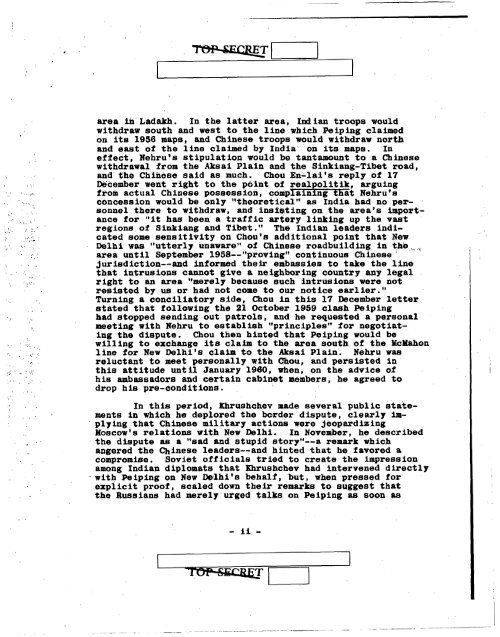The Sino-Indian Border Dispute Section 2: 1959-61 - The Black Vault
The Sino-Indian Border Dispute Section 2: 1959-61 - The Black Vault
The Sino-Indian Border Dispute Section 2: 1959-61 - The Black Vault
You also want an ePaper? Increase the reach of your titles
YUMPU automatically turns print PDFs into web optimized ePapers that Google loves.
,<br />
I<br />
I<br />
area in Ladakh. In the latter area, <strong>Indian</strong> troops would<br />
withdraw south and west to the line which Peiping claimed<br />
on its 1936 maps, and Chinese troops would withdraw north<br />
and east of the line claimed by India on its maps. In<br />
effect, Nehru's stipulation would be tantamount to a Chinese<br />
withdrawal from the Akssi Plain and the Sinkiang-Tibet road,<br />
and the Chinese said as much. Chou En-hi's reply of 17<br />
December went right to the point of real olitik, arguing<br />
from actual Chinese possession, comp r-d-ai- a n ng at Nehru's<br />
concession would be only "theoretical" as India had no personnel<br />
there to withdraw, and insfrsting on the areaos importance<br />
for 'lit has been a traffic artery linking up the vaat<br />
regions of Sinkiang and Tibet." <strong>The</strong> <strong>Indian</strong> leaders indicated<br />
some sensitivity on Chou's additional point that New<br />
Delhi was "utterly unaware" of Chinese roadbuilding in the, ~<br />
area until September 1958--11p~oving1' cont inuaus Chinese '<br />
jurisdiction-and inforlged their embassies to take the line<br />
that intrusions cannot give a neighboring country any legal<br />
right to an area %erely because such intrusions were not<br />
resisted by us or had not come to our notice earlier.1t<br />
Turning a conciliatory side, Chou in this 17 December letter<br />
stated tha& following the 21 October <strong>1959</strong> clash Peiping<br />
had stopped sending out patrols, and he requested a personal<br />
meeting with Nehru to establish "principles" for negotiating<br />
the dispute. Chou then hinted that Peiping would be<br />
willing to exchange its claim to the area south of the McMahon<br />
line for New Delhi's claim to the Aksai Plain. Nehru was<br />
reluctant to meet personally with Ozaou, and persisted in<br />
this attitude until January 1960, when, on the advice of<br />
his ambassadors and certain cabinet members, he agreed to<br />
drop his pre-condit ions.<br />
In this period, Khrushchev made several public statements<br />
in which he deplored the border dispute, clearly implying<br />
that Chinese military actions were jeopardiaing<br />
MoaCQW'S relations with New Delhi, In November, he described<br />
the dispute as a "sad and stupid story1*--a remark which<br />
angered the Chinese leaders=-and hinted that he favored a<br />
compromise. Soviet officials tried to create the Impression<br />
among <strong>Indian</strong> diplomats that Khrushchev had intervened directly<br />
with Peiping on New Delhi's behalf, but, when pressed for<br />
explicit proof, scaled down their remark6 to suggest that<br />
the Russians had merely urged talks on Peiping as soon as<br />
- ii -





![Combat Support in Korea [270 Pages] - The Black Vault](https://img.yumpu.com/49796461/1/190x71/combat-support-in-korea-270-pages-the-black-vault.jpg?quality=85)











